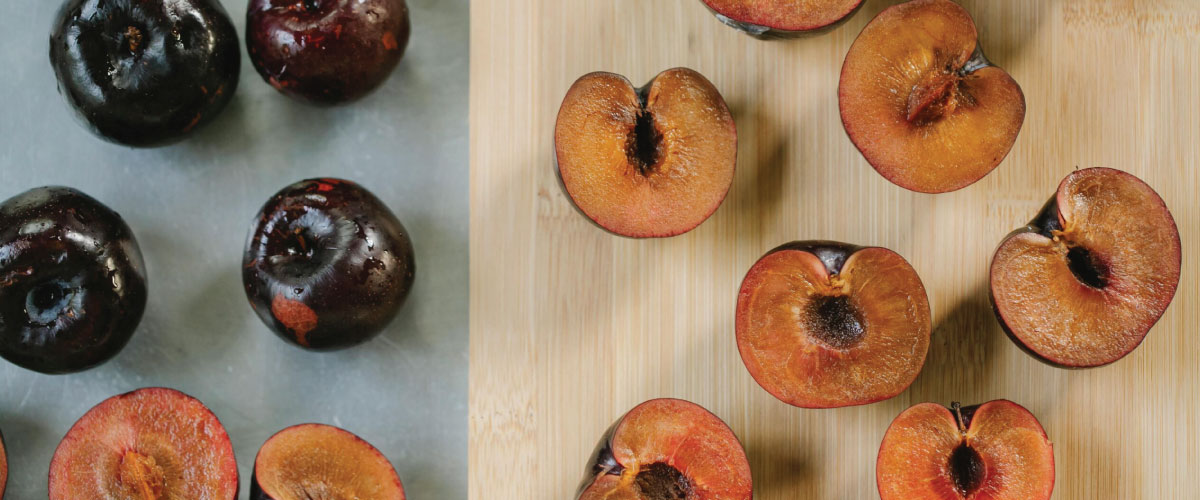A burst of colour, a splash of flavour, and a treasure trove of nutrients—plums are more than just a juicy summer snack. These small fruits have travelled from ancient orchards to our modern kitchens, bringing with them centuries of health benefits. Whether you\’re craving a sweet treat or seeking a natural way to boost your wellness, plum is the perfect addition to your diet. But what makes these vibrant fruits so special? Let\’s dive into the surprising and powerful benefits of plums that go beyond their delicious taste.
Nutritional Content
Plums are nutrient-rich fruits with a variety of healthful compounds. Here\’s an overview of their nutritional content (per 100 grams):
| NUTRITION | CONTENT |
| Energy | 46 kcal |
| Protein | 0.7 g |
| Fats | 0.28 g |
| Carbohydrates | 11.4 g |
| Fibre | 1.4 g |
| Total sugar | 9.92 g |
| Fructose | 3.07 g |
| Calcium | 6 mg |
| Iron | 0.17 mg |
| Magnesium | 7 mg |
| Phosphorus | 16 mg |
| Potassium | 157 mg |
| Vitamin C | 9.5 mg |
| Vitamin A | 17 µg |
| Vitamin E | 0.26 mg |
| Vitamin K | 6.4 µg |
| Vitamin B1 | 0.028 mg |
Health Benefits of Plum
Anti-Inflammatory Properties
Plums are packed with bioactive compounds, especially polyphenols, which have potent anti-inflammatory effects. These compounds help to reduce inflammation by inhibiting the activity of enzymes and pathways that trigger it, including cyclooxygenase (COX) and lipoxygenase (LOX). Inflammation is a key driver of many chronic diseases, including arthritis, heart disease, and metabolic disorders. By regularly consuming plums, you can potentially help your body combat inflammation at its root. This natural anti-inflammatory effect makes plums a great addition to a diet focused on overall health and longevity .
Antioxidant Powerhouse
Plums are rich in antioxidants, including vitamin C, phenolic compounds, and anthocyanins, which help neutralise harmful free radicals. Free radicals are unstable molecules that can damage cells, leading to oxidative stress and the onset of various diseases like cancer, heart disease, and ageing. The high levels of antioxidants in plums have been shown to reduce oxidative stress in the body, supporting skin health, boosting immunity, and preventing cellular damage. Eating plums regularly can offer protection against these degenerative conditions, helping to keep your body functioning optimally .
Antiallergic Benefits
Plums contain compounds that may reduce allergic reactions by stabilising mast cells, which are involved in the body’s allergic responses. Studies show that the polyphenols in plums can suppress the release of histamine, a compound that causes allergy symptoms like sneezing, itching, and swelling. This makes plums a helpful dietary addition for individuals who suffer from seasonal allergies or other allergic reactions. Regular consumption of plums may offer a natural way to manage and reduce the severity of allergic responses .
Cognitive Function Enhancement
Research suggests that plums, especially their polyphenol content, may help improve cognitive function. Animal studies have demonstrated that plum extract can reduce brain cholesterol levels, lower neurodegenerative protein expression, and improve cognitive function, particularly in those consuming a high-cholesterol diet . This cognitive boost is believed to stem from plums’ ability to reduce oxidative stress and inflammation in the brain. Incorporating plums into your diet could be beneficial for brain health and cognitive longevity
Bone Health Promotion
Dried plums, or prunes, are particularly noted for their bone-protective effects, especially in postmenopausal women. Studies have shown that regular consumption of dried plums can prevent bone loss and even restore bone density. This is likely due to their rich content of vitamin K, potassium, and polyphenols, which work together to improve bone metabolism and reduce bone turnover . For women at risk of osteoporosis, adding dried plums to the diet can be a natural and effective way to support bone health .
Cardiovascular Health Support
Plums may contribute to heart health by helping to regulate cholesterol levels and reduce cardiovascular risk factors. The fiber and polyphenols in plums have been shown to lower total cholesterol (TC) and low-density lipoprotein cholesterol (LDL-C), both of which are linked to a higher risk of heart disease . Additionally, the potassium in plums helps maintain healthy blood pressure levels, further protecting against cardiovascular conditions like hypertension and stroke .
Lowering Total Cholesterol and LDL-C
Regular consumption of plums has been linked to lower levels of total cholesterol (TC) and low-density lipoprotein cholesterol (LDL-C), which are risk factors for heart disease. The bioactive compounds in plums, particularly their fiber and polyphenol content, help to reduce cholesterol absorption in the gut and enhance cholesterol excretion . This effect makes plums a valuable dietary option for individuals looking to manage their cholesterol levels naturally and support heart health.
When to Avoid Plums
-
Exotic Fruits
Plum (China) – 6pc
₹120.00Original price was: ₹120.00.₹84.00Current price is: ₹84.00.
When to Avoid Plums
Allergies: Some individuals may be allergic to plums or related fruits. Symptoms can include itching, swelling, or gastrointestinal distress. If you have a known allergy to stone fruits, it\’s best to avoid plums.
Gastrointestinal Issues: Plums are high in fibre, which can cause digestive discomfort, gas, or diarrhoea in some people, particularly if consumed in large quantities. Individuals with conditions like irritable bowel syndrome (IBS) may need to limit their intake.
Oxalate Content: Plums contain oxalates, which can contribute to kidney stones in susceptible individuals. If you have a history of kidney stones, particularly calcium oxalate stones, it may be advisable to limit your intake of high-oxalate foods, including plums.
Medication Interactions: Plums, especially dried plums (prunes), may interact with certain medications, particularly those that affect blood sugar levels or anticoagulants. It is advisable to consult a healthcare provider if on medication.
Common Varieties of Plums
Plum varieties generally categorised under European and Japanese plums, here’s brief descriptions of each :
European Plums (Prunus domestica)
European plums are primarily grown for fresh eating and drying. They are characterised by their dense, sweet flesh and are often used for making prunes. Some popular varieties include:
Stanley:
This variety is widely recognized for its consistent yields and excellent flavour. It has dark blue skin and golden-yellow flesh, making it ideal for drying into prunes. Stanley plums are also versatile in culinary uses, suitable for jams and desserts.
President:
Known for its large size and oval shape, President plums have a rich, sweet flavour. They are dark purple and can be eaten fresh or used in cooking and baking. This variety is particularly appreciated for its high sugar content and juicy texture.
Damson:
Smaller and more tart than other European plums, Damson plums are often used for preserves, jellies, and cooking. Their unique tartness makes them less popular for fresh eating, but they add depth to culinary dishes.
Japanese Plums (Prunus salicina)
Japanese plums are known for their juicy texture and sweet flavor, making them popular for fresh consumption. Here are a few notable varieties:
Santa Rosa:
This classic variety is famous for its sweet-tart flavour and vibrant reddish-purple skin. Santa Rosa plums are juicy and firm, making them a favourite for fresh eating and desserts. They ripen in mid-summer
Satsuma:
Dark red in colour, Satsuma plums are known for their excellent sweetness and firm texture. They are typically enjoyed fresh but can also be used in cooking. This variety is highly prized for its rich flavour and vibrant colour
Shiro:
Shiro plums are easily recognizable by their bright yellow skin. They are exceptionally sweet and juicy, often ripening earlier than other varieties. Shiro plums are commonly enjoyed fresh and are popular in home gardens.
Some popular ways of consuming plums:
Fresh Eating:
Plums are delicious when eaten fresh. Their sweet and juicy flesh makes them a perfect snack on hot days. Simply wash them and bite into the fruit to enjoy their natural flavour.
Salads:
Sliced plums can be added to salads for a refreshing twist. They pair well with greens, nuts, and cheese, creating a delightful combination of flavours and textures. A common pairing is plums with arugula, goat cheese, and walnuts.
Desserts:
Plums can be used in various desserts, such as tarts, pies, and crumbles. Their natural sweetness and juicy texture enhance baked goods, adding flavour and moisture. Plum clafoutis and plum galettes are popular recipes.
Dried Fruits:
Dried plums, commonly known as prunes, are a popular snack and are known for their digestive health benefits. They can also be used in baking or added to cereals and granola for extra flavour.
Smoothies:
Plums can be blended into smoothies for a nutritious drink. They add natural sweetness and can be combined with other fruits like bananas, berries, or yoghurt for added creaminess.
Key Takeaways
Plums are a vibrant fruit packed with nutrients and health benefits. Rich in bioactive compounds, they offer powerful anti-inflammatory and antioxidant properties, which help combat chronic diseases and oxidative stress. Their unique polyphenols may also support cognitive function and alleviate allergic reactions by stabilizing mast cells. Dried plums, or prunes, are particularly beneficial for bone health, potentially preventing bone loss, especially in postmenopausal women. Additionally, plums can aid cardiovascular health by regulating cholesterol levels and maintaining healthy blood pressure. However, individuals with allergies, gastrointestinal issues, or a history of kidney stones should exercise caution when consuming plums.
-
Exotic Fruits
Plum (China) – 6pc
₹120.00Original price was: ₹120.00.₹84.00Current price is: ₹84.00.



